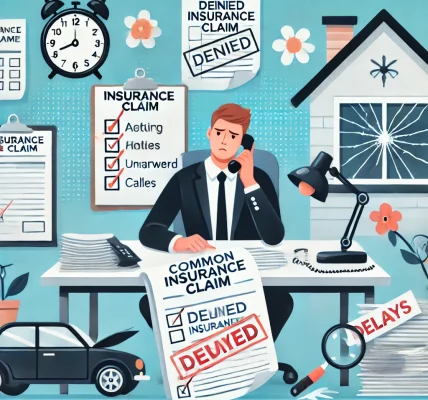Dealing with an insurance claim can be a frustrating and time-consuming process. Insurance companies have their own adjusters to assess damages and determine payout amounts, but these adjusters work for the insurer—not for you. If you feel that your claim is undervalued, delayed, or unfairly denied, hiring a public adjuster might be the right decision.
This guide will help you understand when and why hiring a public adjuster can be beneficial for your insurance claim.
What is a Public Adjuster?
A public adjuster is a licensed professional who represents policyholders in negotiating insurance claims. Unlike insurance company adjusters who work for the insurer, public adjusters work for you, ensuring you receive a fair settlement.
Public adjusters specialize in evaluating losses, interpreting insurance policies, and negotiating with insurance companies. They handle claims for property damage, business interruptions, and other insurance disputes.
When Should You Consider Hiring a Public Adjuster?
While not every insurance claim requires a public adjuster, certain situations make their services invaluable.
1. Your Claim is Complex or High-Value
If your claim involves extensive property damage, business losses, or significant repairs, a public adjuster can help ensure every aspect of your loss is properly documented and valued.
Examples:
- Fire or water damage affecting multiple parts of your property.
- Business interruption claims where loss calculations are complex.
- Luxury home or high-value item claims where precise valuation is essential.
2. Your Claim Has Been Delayed
Insurance companies sometimes delay processing claims, leaving you without the compensation you need. A public adjuster can expedite the process by handling negotiations and ensuring your insurer follows the required timelines.
Signs of a delayed claim:
- No response from the insurer for weeks.
- Repeated requests for additional information without clear explanations.
- Unjustified claim processing delays.
3. Your Settlement Offer is Too Low
Insurance companies may undervalue your claim, offering a settlement that doesn’t fully cover your losses. A public adjuster assesses the damage independently and negotiates for a higher payout.
Warning signs of an undervalued claim:
- The initial settlement is significantly lower than repair estimates.
- The insurer does not explain how they calculated the payout.
- Your total losses are not adequately considered.
4. Your Claim Was Denied Unfairly
If your claim has been denied and you believe it was unjust, a public adjuster can help review your policy, gather additional evidence, and appeal the decision.
Reasons insurance claims may be unfairly denied:
- The insurer claims policy exclusions that may not apply.
- The company says there was insufficient evidence.
- There are discrepancies in the insurer’s damage assessment.
5. You Don’t Have Time to Handle the Claim Process
Managing an insurance claim requires time and effort—especially for large or complicated cases. If you’re busy or unsure how to navigate the claims process, a public adjuster can handle everything for you.
How Does a Public Adjuster Help?
A public adjuster acts as your advocate by:
- Reviewing your insurance policy to maximize your claim potential.
- Documenting and evaluating damages using professional tools and industry standards.
- Negotiating with the insurance company to ensure you receive a fair settlement.
- Handling communication with the insurer to prevent delays and misunderstandings.
- Appealing denied claims, if necessary, using legal and factual arguments.
How Much Does a Public Adjuster Cost?
Public adjusters typically work on a contingency fee basis, meaning they take a percentage (usually 5-20%) of the final settlement amount. Some states have regulations on maximum fees.
Pros of a contingency-based fee:
- No upfront payment required.
- The adjuster is motivated to secure the highest possible settlement.
- You only pay if you receive a payout.
Choosing the Right Public Adjuster
If you decide to hire a public adjuster, consider the following:
1. Check Licensing and Credentials
Ensure the adjuster is licensed in your state and has a good reputation. Many states require public adjusters to pass an exam and adhere to ethical standards.
2. Look for Experience and Specialization
Some adjusters specialize in certain types of claims, such as residential property, business claims, or disaster-related damages. Choose one who has handled cases similar to yours.
3. Read Reviews and Ask for References
Online reviews and recommendations from past clients can help you find a trustworthy adjuster.
4. Understand the Fee Structure
Be clear on how much the adjuster will charge and whether additional fees apply. Avoid adjusters who demand large upfront fees.
Final Thoughts
Hiring a public adjuster can be a smart move when dealing with complex, undervalued, or denied insurance claims. They work on your behalf to ensure you receive the compensation you deserve.
If you’re struggling with your insurance claim, a public adjuster can help you navigate the process and maximize your settlement. Before hiring one, do your research and ensure they are licensed, experienced, and transparent about their fees.
Would you like assistance finding a reliable public adjuster for your specific claim? Let us know!




